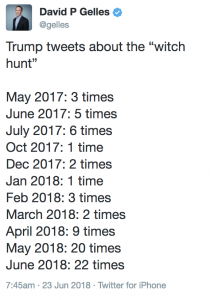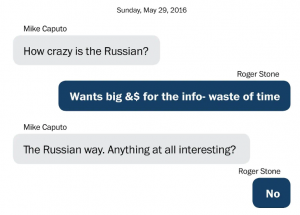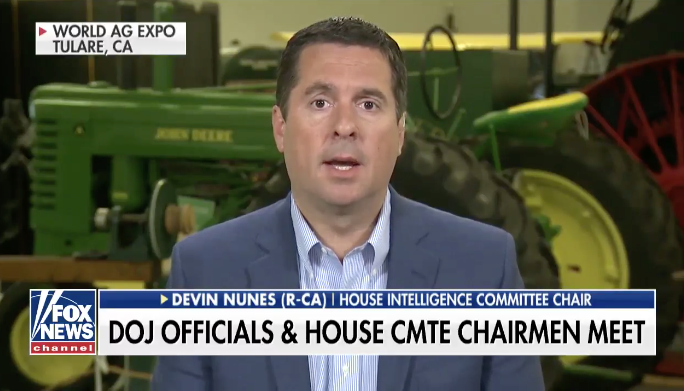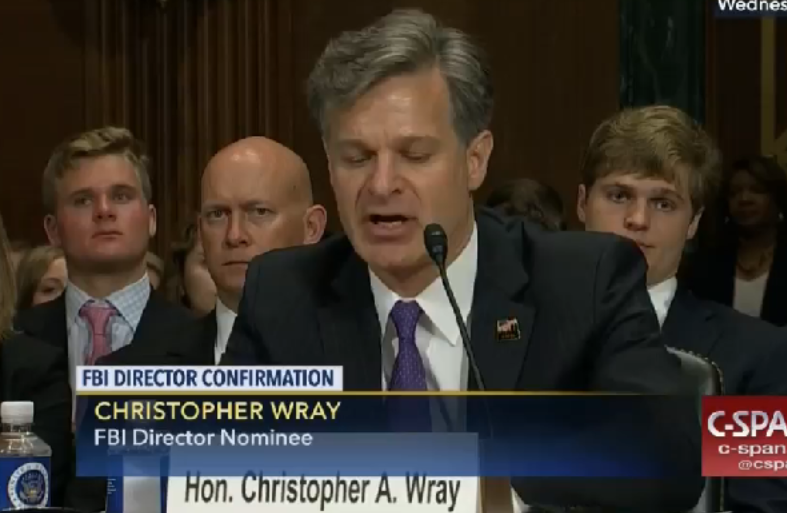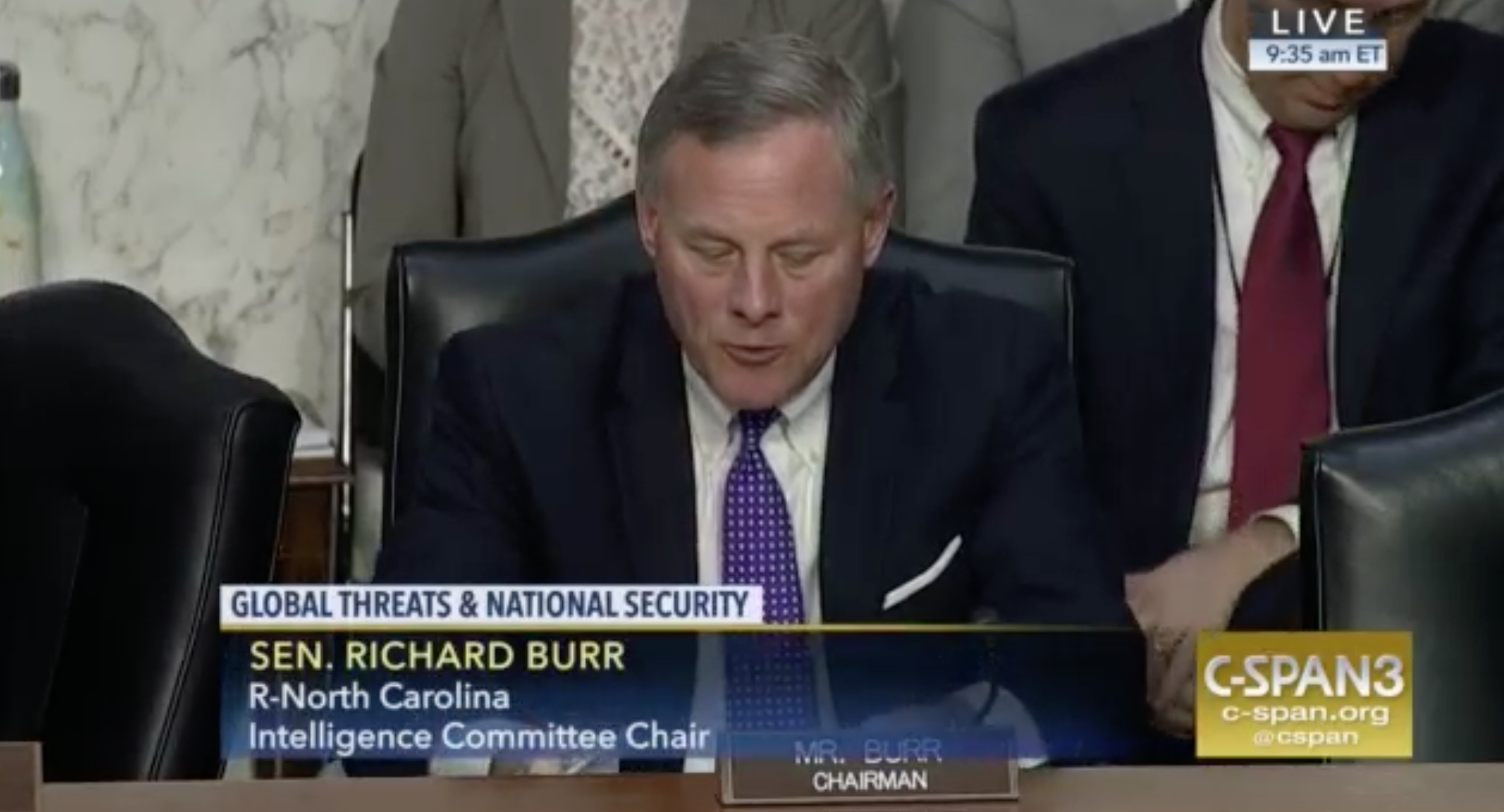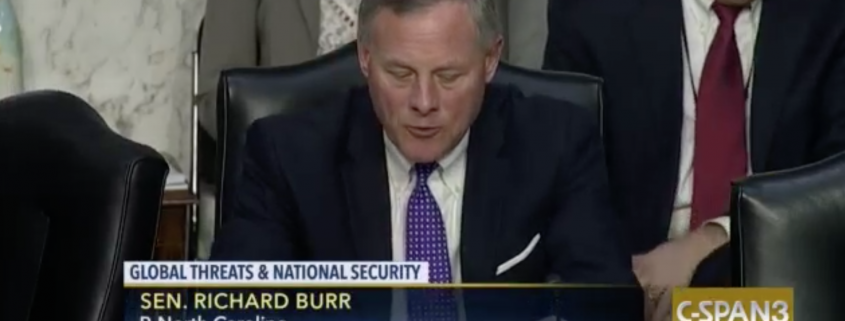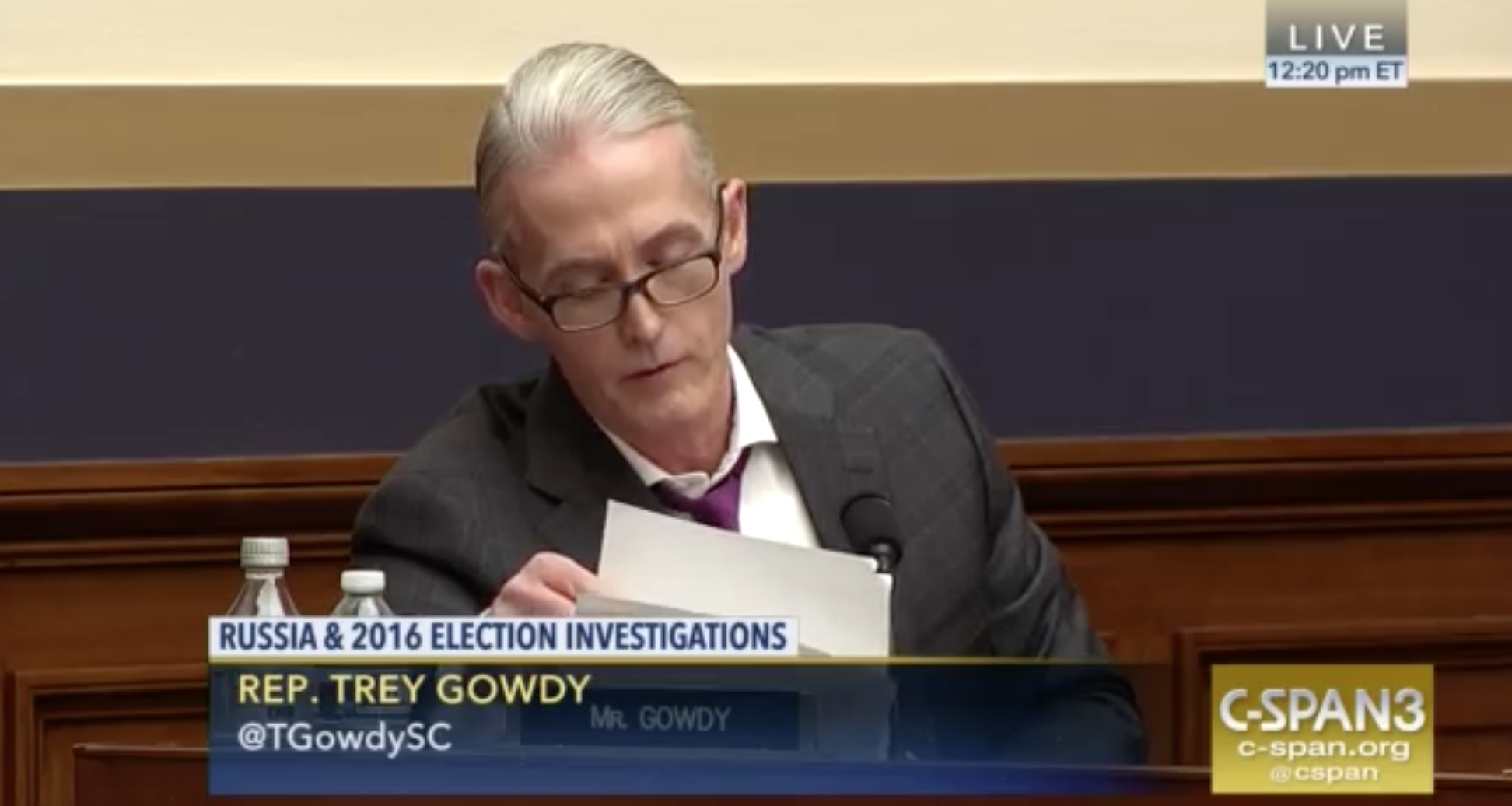Back during Nunes Week, Trey Gowdy described the importance of Robert Mueller’s investigation by stating that we were only seeing half of what he was doing. The other half of his work, Gowdy said, was the counterintelligence side, the investigation into what Russia did to the US in 2016.
Friday, Rod Rosenstein rolled out the first glimpse of the other half of that investigation, an indictment of 13 Russians tied to the Internet Research Agency, the Russian troll factory. The indictment accuses IRA of 8 crimes: criminal conspiracy to defraud the United States, conspiracy to commit wire fraud and bank fraud, and five counts of aggravated identity theft.
In the wake of that indictment, the court unsealed a February 7 plea agreement with Californian Richard Pinedo, for identity theft (basically, selling bank account numbers; the information doesn’t identify the users who purchased the bank account numbers as IRA personnel who used them to set up “American” identities, but that is clearly what happened).
The 13 Russians charged in the IRA indictment — which include Yevgeniy Prigozhin, the close Putin associate who owns the company, those in charge of the operation (which was not limited to US targeting), down to a few of the analysts who did the troll work — will never be extradited to the US, though the most senior among them will surely be sanctioned. Nor will Putin in any way retaliate against them — they were doing work he approved of! Further, by criminalizing “information warfare” (as the Russians admitted they were engaged in, and as we do too, under the same name) we risk our own information warriors being indicted in other countries.
So what purpose did the indictment serve? Here are some thoughts:
Creating a paper trail
Rosenstein and Chris Wray have both said they believe investigators should speak through indictments and other official documents, not through Comeyesque press conferences. Here we have an indictment that serves as a record of what Mueller’s team has found.
We would probably have gotten it in any case, as Jeff Sessions’ DOJ has emphasized bringing more cybersecurity related indictments.
But that we did get it addresses one of the questions we’ve gotten about the Mueller investigation: whether we’ll get to read a report of what he has found.
To the extent that something is indictable, even if that indictment would name Russians or others located overseas, I guess we should expect more of the same.
Establishing bipartisan credibility for the larger investigation
The reason I keep pointing to Gowdy’s statements in support of the investigation in the last several weeks is because his actions seem to reflect one of the most partisan Republicans reacting soberly to an attack on the country, rather than just one party.
And while the details of the indictment — most notably that the trolls affirmatively supported Bernie Sanders as well as Trump — have resurfaced the old primary recriminations, for the most part, the indictment has provided a way for people from both parties to agree to the reality of the attack. Trump said Mueller did a good job with the indictment (admittedly, he may be currying favor). Trump’s National Security Advisor HR McMaster responded to the indictment by declaring the evidence that Russia interfered in the election “incontrovertible.” This indictment offers a way for even self-interested Republicans to start acknowledging the reality of what happened.
The indictment also gave Rod Rosenstein an opportunity to own this investigation with a press conference announcing it. None of the prosecutors tied to the case appeared (since I track these things, know that Jeannie Rhee, Rush Atkinson, and Ryan Dickey are on the docket), just Rosenstein. Hopefully, tying him to this non-offensive indictment will make it harder to fire Rosenstein, and thereby further protect Mueller.
Reiterating the crime of conspiracy to defraud the United States
The most interesting of the three crimes charged in the IRA indictment is the first, the conspiracy to defraud the United States. The indictment describes the conspiracy this way:
U.S. law bans foreign nationals from making certain expenditures or financial disbursements for the purpose of influencing federal elections. U.S. law also bars agents of any foreign entity from engaging in political activities within the United States without first registering with the Attorney General. And U.S. law requires certain foreign nationals seeking entry to the United States to obtain a visa by providing truthful and accurate information to the government.
Effectively, Mueller is saying that it’s not illegal, per se, to engage in political trolling (AKA information warfare), but it is if you don’t but are legally obliged to register before you do so. That’s an important distinction, because much of what these trolls did is accepted behavior in American politics — all sides did this in 2016, including people employed by campaigns and others expressing their own political opinions. Trolling (AKA information warfare) only becomes illegal when you don’t carry out the required transparency or reporting before you do so.
The charge of a conspiracy to defraud the United States has a very important parallel elsewhere in this investigation, in the first charge in the Paul Manafort and Rick Gates indictment. The indictment explains,
It is illegal to act as an agent of a foreign principal engaged in certain United States influence activities without registering the affiliation. Specifically, a person who engages in lobbying or public relations work in the United States (hereafter collectively referred to as lobbying) for a foreign principal such as the Government of Ukraine or the Party of Regions is required to provide a detailed written registration statement to the United States Department of Justice. The filing, made under oath, must disclose the name of the foreign principal, the financial payments to the lobbyist, and the measures undertaken for the foreign principal, among other information. A person required to make such a filing must further make in all lobbying material a “conspicuous statement” that the materials are distributed on behalf of the foreign principal, among other things. The filing thus permits public awareness and evaluation of the activities of a lobbyist who acts as an agent of a foreign power or foreign political party in the United States.
The Manafort indictment then argues that by hiding that the lobbying work they were doing was on behalf of Ukraine’s Party of Regions they, “knowingly and intentionally conspired to defraud the United States by impeding impairing, obstructing, and defeating the lawful governmental functions of a government agency, namely the Department of Justice and the Department of the Treasury.” I’ll have more to say about this parallel in coming days, but suffice it to say that Mueller is alleging that Manafort is the mirror image of the troll farm, engaging in politics while hiding on whose behalf he’s doing it (he was arguably doing the same in Ukraine). [Update: see this post for more on how this might work.]
In both cases, the indictments substantiate the conspiracy by naming a variety of crimes, like money laundering and identity theft.
I suspect we’ll be seeing more of this structure going forward (and suspect it’s something the numerous appellate specialists on Mueller’s team have been spending a lot of time thinking about).
Laying out how Americans might be involved with or without “colluding”
Much has been made of Rosenstein’s line, “There is no allegation in the indictment that any American was a knowing participant in the alleged unlawful activity.” I don’t read too much into that. Rather, I think Rosenstein included it because the indictment does explicitly and implicitly describe actions many Americans and possible Americans took that were part of this conspiracy. That includes:
Illegal compensated acvitities
- Richard Pinedo: Selling Russian trolls (and others) bank account numbers they can use to conduct identity fraud
- Unknown persons: Providing social security numbers and fake US drivers licenses of Americans
- Unknown persons: Selling stolen credit card information
Presumptively legal compensated activities
- Unknown Americans: Renting servers in the US to run VPNs to hide their foreign location
- Yahoo, Gmail, Paypal: Providing email and PayPal accounts the Russians used as the basis for social media accounts
- Twitter, Instagram, Facebook: Providing those social media accounts
- Twitter, Instagram, Facebook: Selling advertisements on social media
- Unknown Trump associates: Paying for IRA rally expenses
- Paid providers: Building a cage, acquiring a costume, and posing as Hillary in prison stunt at a FL event
- Unknown US person: Providing posters for a Support Hillary, Save American Muslims rally
- Unknown American: Holding a sign in front of the White House on May 29, 2016
Uncompensated activities
- Unknown Americans: Interacting with Aleksandra Krylova and Anna Bogacheva when they traveled to the US sometime between June 4 and June 26, 2014 to conduct reconnaissance and another co-conspirator that November
- Members of the media: Accepting tips and promoting IRA events
- A member of a real TX-based Tea Party organization: Advising the conspirators to focus on the purple states “like Colorado, Virginia & Florida”
- Unwitting members, volunteers, and supporters of the Trump Campaign involved in local community outreach, as well as grassroots groups that supported then-candidate Trump: Distributing IRA materials through existing channels of those groups
- Administrators of large social media groups focused on U.S. politics: Promoting IRA events
- Trump volunteer: Providing signs for the March for Trump event and otherwise recruiting for it
- A Florida-based political activist identified as the “Chair for the Trump Campaign” in a particular Florida county: Advising on more locations and logistics for the Florida Trump event
- Campaign Officials 1, 2, and 3: discussing the Florida events
Later the indictment describes a database of 100 real US persons whom the trolls treated as recruiting targets, complete with profiling.
On or about August 24, 2016, Defendants and their co-conspirators updated an internal ORGANIZATION list of over 100 real U.S. persons contacted through ORGANIZATION-controlled false U.S. persona accounts and tracked to monitor recruitment efforts and requests. The list included contact information for the U.S. persons, a summary of their political views, and activities they had been asked to perform by Defendants and their co-conspirators.
Here’s the important thing about all this. While Pinedo pled guilty and faces 12-18 months even with his cooperation agreement (and even there, while the information makes it clear he knew he was dealing with foreigners, his lawyer has made it clear he didn’t know who or what he was dealing with), there are only two other known illegal roles in this conspiracy, and there’s no reason those roles would have had to be carried out by Americans. Perhaps Mueller has others cooperating, perhaps those other criminals are unknown. But as for the rest, they are (as Rosenstein made clear) not guilty of any kind of conspiracy with Russia.
DOJ just rolled out an indictment in which probably 20 Americans can recognize themselves (many of whom were likely interviewed), about as many as all the Trump officials named in one or another plea agreement so far. Yet, as far as Mueller knows, none of these people did anything but conduct business or engage in sincerely held politics. They almost certainly had far less reason to be suspicious of the trolls they were being used by than Facebook and Twitter. Those actions have been tainted now through no fault of their own.
Which is something to remember: I’ve seen Hillary supporters, in the same breath, criticize Bernie or Jill Stein supporters because their preferred candidate was treated favorably by the trolls, yet in the same breath suggesting the black and Muslim activists targeted are innocent victims.
Obviously, Hillary and her supporters are victims. But everyone is, even the Trump volunteers. Because to the extent they had honestly held beliefs, the Russian operation tainted those beliefs, it diminished the weight of their honestly held beliefs. They were used by Russian trolls, most of them without the same profit motive that led Facebook and Twitter to allow themselves to be used. And we should remember that.
Hinting at what the US has
There are, however, a few tactical things this indictment does, starting with hinting at what other evidence the US has. This indictment was relatively easy, in that Adrian Chen (in a June 2015 article that still gets too little attention), Facebook and (to a lesser extent) other social media outlets, the Daily Beast, and SSCI generally have already laid out what IRA did. The indictment slaps some criminal charges on fraudulent behavior that enabled it, and without showing much about any additional evidence Mueller collected, you’ve got a showy indictment.
There are two hints, however, of the additional evidence used (which, given that the named conspirators will never face trial, will never need to be disclosed or explained). First, in a passage about how IRA started to cover their tracks after Mueller started focusing on this activity, there’s the reference to Irina Kaverzina.
On or about September 13, 2017, KAVERZINA wrote in an email to a family member: “We had a slight crisis here at work: the FBI busted our activity (not a joke). So, I got preoccupied with covering tracks together with the colleagues.”
Kaverzina was just a low-level troll and this may be nothing more than Section 702 collected email off GMail or Yahoo, or it may be a more formal intercept. But Mueller obtained communications from at least one of the indictees. Emails from more senior people, such as Prigozhin or his more senior managers (or the IT guys buying server space in the US) would be more interesting.
Plus, Mueller likely obtained cooperation from one IRA employee, the unnamed person who traveled to Atlanta in November 2014 for reconnaissance. Had that person not cooperated, he or she would have been named in the indictment.
Nevertheless establishing the political stakes
I said above that none of the hundred-plus Americans who were unknowingly used by trolls should be considered anything but victims. Their chosen political views, loathsome or not, have now been tainted, and not because of anything they’ve done except perhaps show too much trust or credulity.
But there are hints that Mueller is using this indictment to set up a more important point.
For example, the indictment (perhaps because of Mueller’s mandate) focuses on political activities supporting or opposing one or another 2016 candidate. Even where topics (immigration, Muslim religion, race) are not necessarily tied to the election, they’re presented here as such. Unless Facebook’s public reports are wrong, this is a very different emphasis than what Facebook has said the IRA focused on. Which is to say that Mueller’s team are focusing on a subset of the known IRA trolling, the subset that involves the 2016 contest between Trump and Hillary.
And there are several events, in particular, that may one day serve as details in a larger conspiracy. Most interesting, for the timing and location, are the twin anti-Hillary and pro-Trump events in NYC in June and July 2016.
In or around June and July 2016, Defendants and their co-conspirators used the Facebook group “Being Patriotic,” the Twitter account @March_for_Trump, and other ORGANIZATION accounts to organize two political rallies in New York. The first rally was called “March for Trump” and held on June 25, 2016. The second rally was called “Down with Hillary” and held on July 23, 2016.
a. In or around June through July 2016, Defendants and their co-conspirators purchased advertisements on Facebook to promote the “March for Trump” and “Down with Hillary” rallies.
b. Defendants and their co-conspirators used false U.S. personas to send individualized messages to real U.S. persons to request that they participate in and help organize the rally. To assist their efforts, Defendants and their co-conspirators, through false U.S. personas, offered money to certain U.S. persons to cover rally expenses.
c. On or about June 5, 2016, Defendants and their co-conspirators, while posing as a U.S. grassroots activist, used the account @March_for_Trump to contact a volunteer for the Trump Campaign in New York. The volunteer agreed to provide signs for the “March for Trump” rally.
[snip]
On or about July 23, 2016, Defendants and their co-conspirators used the email address of a false U.S. persona, [email protected], to send out press releases to over thirty media outlets promoting the “Down With Hillary” rally at Trump Tower in New York City.
The description of a IRA-organized event at Trump Tower the day after WikiLeaks dropped the DNC emails, in particular, suggests the possibility of a great deal of coordination, coordination with people in the US.
Similarly, the extended descriptions of events in Florida may also take on added relevance in the future, particularly coming as they did in tandem with Guccifer 2.0’s release of DCCC data targeting FL. (And this, in turn, should focus even more attention on the FL congressmen like Matt Gaetz and Ron DeSantis who’re leading the pushback on Mueller’s investigation.)
Using the term “co-conspirator” 119 times
Perhaps most interesting, given the tiny nods to what other intelligence Mueller might have, are the 119 uses of the word “co-conspirators.” Almost all of these uses seem to necessarily mean unnamed IRA employees working from the same St. Petersburg location described as trolling. Several times the co-conspirators are clearly described as located in Russia. So it may be that all references to co-conspirators here are just a way to refer to the 70 other people involved in this operation at IRA. But that’s not necessarily the case.
Other uses of “co-conspirator” involve wider knowledge, perhaps an outsider’s knowledge of a go-between role Prigozhin might have had.
But others are things that might have involved a stateside co-conspirator, such as the mention of co-conspirators helping to set up the May 29, 2016 Prigozhin birthday tribute in front of the White House, co-conspirators tracking US social media use, co-conspirators engaged in identity theft, co-conspirators promoting claims of voter fraud, co-conspirators destroying data. Several of those things (such as tracking US social media use or claiming Hillary was going to steal the election) are things we know Trump associates were also doing. Others might be facilitated by someone stateside. So those uses of the term could be people not employed by IRA.
Which is to say, this indictment might be (probably is) intended to address just the activities of those employed by IRA. But that’s not necessarily the case.
Update: added the public indictment part.


